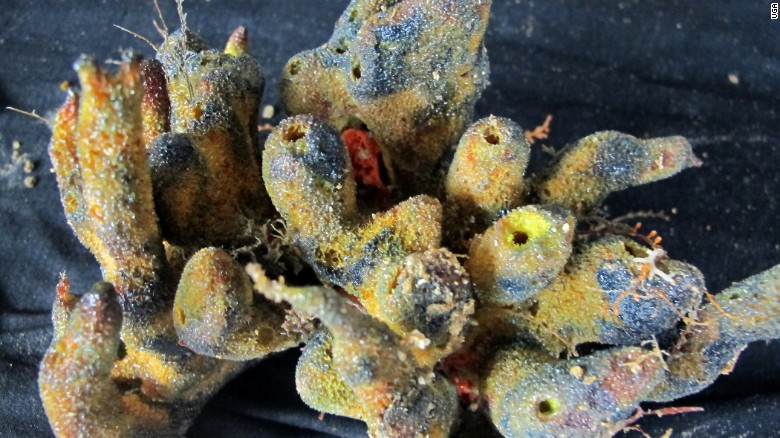1. Are the Beautiful Colors of the Great Barrier Reef Gone?
According to The Guardian, "North Queensland tourism operators are routinely refusing to take media and politicians to see coral bleaching on the Great Barrier Reef for fear the attention will trigger a collapse in visitor numbers". Recent research by scientists from the National Coral Bleaching Taskforce showed that almost 93% of the Great Barrier Reef was suffering from bleaching. There is a conflict in the region between maintaining eco-tourism and showcasing the bleaching to promote conservation efforts. Read more...
-----------------------------------------------
2. Glow in the Dark Sharks Under Investigation!
 This week, researchers published some new information about the catshark in Scientific Reports. The catshark is species most well known for giving off a glow in blue light. Researchers created a camera to simulate the way that the sharks see eachother under water. The team studied the chain catshark and the swell shark which both love around 2,000 feet below sea level. Catsharks have molecules in their skin that allow them to absorb some of the blue light and re-emit it as other colors, this is referred to as bioflouresence. . Read more...
This week, researchers published some new information about the catshark in Scientific Reports. The catshark is species most well known for giving off a glow in blue light. Researchers created a camera to simulate the way that the sharks see eachother under water. The team studied the chain catshark and the swell shark which both love around 2,000 feet below sea level. Catsharks have molecules in their skin that allow them to absorb some of the blue light and re-emit it as other colors, this is referred to as bioflouresence. . Read more...
-----------------------------------------------
3. Record Number of Gray Whales Spotted off So Cal Coast
-----------------------------------------------
4. Scientists Have Discovered a 600 Mile Coral Reef
 A team of researchers have discovered a new sponge and coral reef more than 600 miles long at the mouth of the Amazon River. The reef appears to cover more than 3,600 square miles of the ocean floor at the edge of the South American continental shelf. A international team of scientists from the University of Georgia and the Federal University of Rio de Janeiro was on an expedition to learn more about the Amazon River plums when this was discovered. The paper, published in Science, details the reef and the various fish, sponges, and marine life found along the shelf. Read more...
A team of researchers have discovered a new sponge and coral reef more than 600 miles long at the mouth of the Amazon River. The reef appears to cover more than 3,600 square miles of the ocean floor at the edge of the South American continental shelf. A international team of scientists from the University of Georgia and the Federal University of Rio de Janeiro was on an expedition to learn more about the Amazon River plums when this was discovered. The paper, published in Science, details the reef and the various fish, sponges, and marine life found along the shelf. Read more...
-----------------------------------------------
 This week, federal biologists ended tagging endangered killer whales in the Puget Sounds after a dead orca was found with pieces of a dart tag lodged in its dorsal fin. In this case, researchers use a dart projector to fire small satellite-linked transmitters which are around the size of a 9-volt battery. The transmitter is attached with two titanium darts and is designed to detach over time leaving nothing on the whale. Although the original review did not reveal any infection, NOAA researchers will assess what went wrong with the transmitter. The federal permit requires this immediate stop and investigation once an issue occurs with this practice. that particular tag was uesd 533 times on whales and other marine mammals and parts of the dart remained in the animals on 1 percent of the cases. In the past, these investigation have lead to redesigns to improve tagging safety. Read more...
This week, federal biologists ended tagging endangered killer whales in the Puget Sounds after a dead orca was found with pieces of a dart tag lodged in its dorsal fin. In this case, researchers use a dart projector to fire small satellite-linked transmitters which are around the size of a 9-volt battery. The transmitter is attached with two titanium darts and is designed to detach over time leaving nothing on the whale. Although the original review did not reveal any infection, NOAA researchers will assess what went wrong with the transmitter. The federal permit requires this immediate stop and investigation once an issue occurs with this practice. that particular tag was uesd 533 times on whales and other marine mammals and parts of the dart remained in the animals on 1 percent of the cases. In the past, these investigation have lead to redesigns to improve tagging safety. Read more...
-----------------------------------------------
Be sure to "LIKE" http://facebook.com/SeaSave to ensure our "Week in Review" is delivered to your newsfeed every Thursday.
Sea Save Foundation is committed to raising awareness of marine conservation. The Week in Review is a team effort produced by the Sea Save staff to provide a weekly summary of the latest in marine research, policy, and news.
